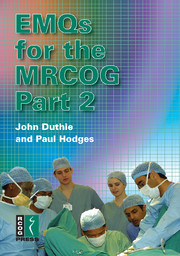Book contents
- Frontmatter
- Contents
- Preface
- Acknowledgements
- Abbreviations
- Foreword
- How to use this book
- 1 The educational and evaluative benefits of EMQs
- 2 EMQ answering technique
- 3 Worked examples
- 4 Mock examination 1
- 5 Mock examination 2
- 6 Mock examination 1 answers
- 7 Mock examination 2 answers
- Appendix 1 Mock examinations answer keys
- Appendix 2 Mock examinations answer sheet (blank)
- Index
Preface
Published online by Cambridge University Press: 05 July 2014
- Frontmatter
- Contents
- Preface
- Acknowledgements
- Abbreviations
- Foreword
- How to use this book
- 1 The educational and evaluative benefits of EMQs
- 2 EMQ answering technique
- 3 Worked examples
- 4 Mock examination 1
- 5 Mock examination 2
- 6 Mock examination 1 answers
- 7 Mock examination 2 answers
- Appendix 1 Mock examinations answer keys
- Appendix 2 Mock examinations answer sheet (blank)
- Index
Summary
The written paper for the Part 2 MRCOG examination is undergoing significant change. Extended matching questions (EMQs) are being introduced as a component of the written paper from September 2006 onwards. The purpose of the change is to develop a format of testing which probes a candidate's understanding of the subject, enables adequate coverage of the syllabus and increases the objectivity of marking.
Both of us have served on the Part 2 EMQ Sub-committee of the Royal College of Obstetricians and Gynaecologists from its foundation, working with colleagues in order to develop, discuss, debate and refine EMQs for the Part 2 examination. We have written this book to assist doctors in their preparation for success in an examination that is designed to measure their medical ability to help women. We trust that you will find our book helpful and we wish you every success in your chosen career.
Information
- Type
- Chapter
- Information
- EMQs for the MRCOG Part 2 , pp. viiPublisher: Cambridge University PressPrint publication year: 2006
